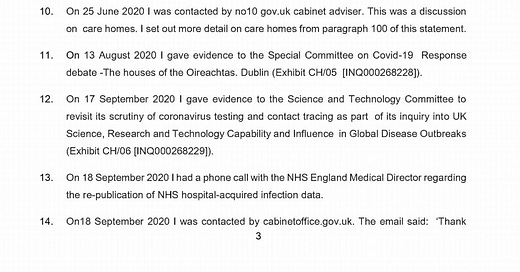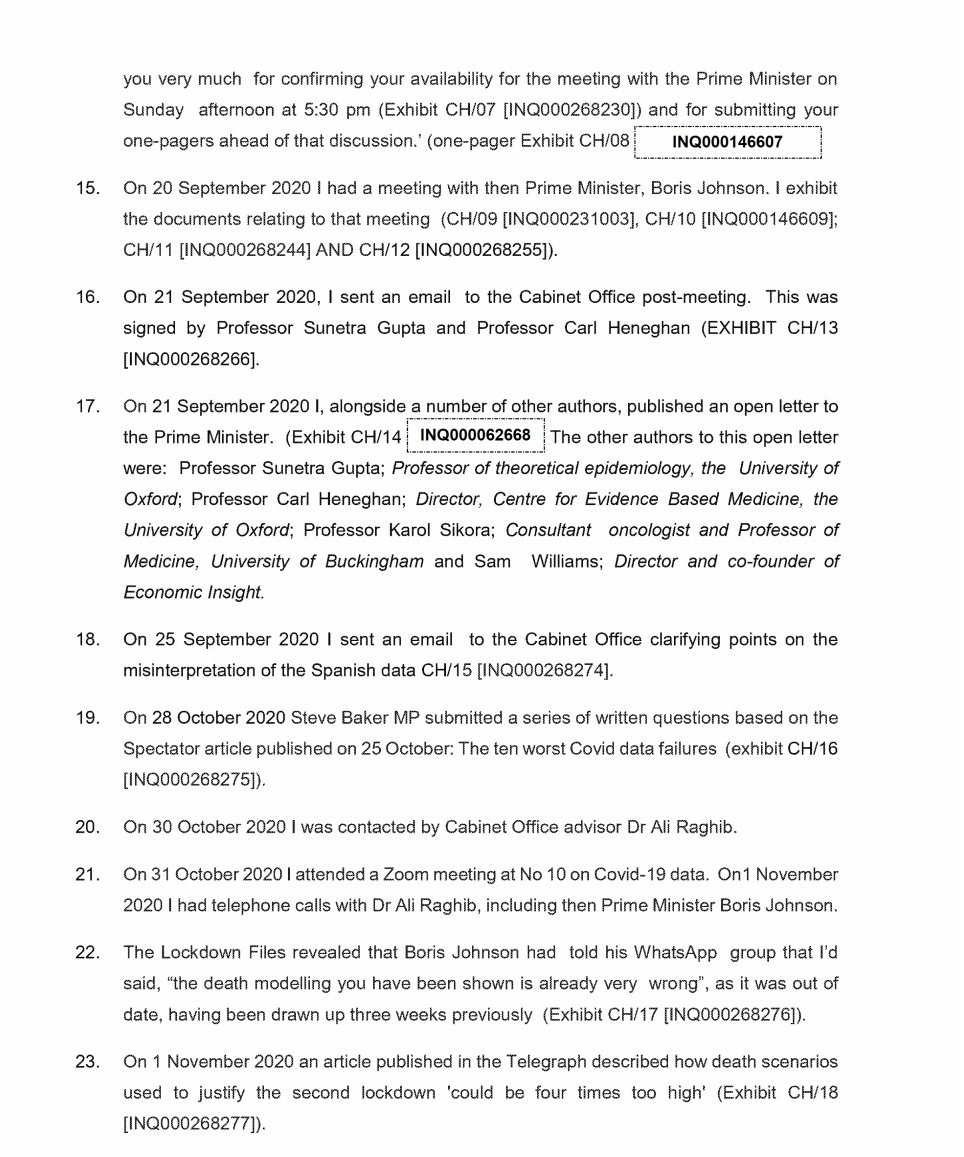"Silenced and censored" Carl Heneghan's list of interactions with UK government in 2020
Inquiry witness statement includes multiple meetings with Cabinet Office and No 10,
High profile anti-lockdown academic Professor Carl Heneghan has revealed in his witness statement to the covid inquiry that he had 25 interactions with the government in 2020, including multiple times with the Cabinet Office and No 10. The witness statement brings into question claims from sections of the media that voices opposing lockdown were silenced and censored by the government. Despite having had direct access to the top of government Heneghan states the government “used all its powers to silence those seen to peddle radioactive views”, citing an FOI that the Counter Disinformation Unit had flagged his social media content as disinformation, however there is no evidence of government censorship.
Heneghan was one of three alternative experts who met with Boris Johnson on 20 September before the prime minister decided against a circuit breaker, instead opting for a tier system that proved ineffective. The other external attendees were Anders Tegnell architect of Sweden’s response and Sunetra Gupta coauthor of the GBD that advocated for a mass infection strategy to reach herd immunity. Heneghan is Gupta’s colleague on the board of Collateral Global, a successor organisation to the GBD. Other board members include GBD coauthors Jay Bhattacharya and Martin Kulldorf. Collateral Global is funded primarily by Swiss billionaire and Conservative Party donor Georg Von Opel’s foundation and the King of Belgium’s King Baudouin Foundation which allows donors to make anonymous donations to organisations.
Sections of the press were outraged at what they perceived to be Heneghan's mistreatment when he appeared at the covid inquiry due to having been asked about being referred to in a derogatory term by government advisors in WhatsApp messages. Displeasure at the hearings has led to efforts to delegitimize the inquiry, however the hearings are only part of the inquiry, witness statements and written evidence will also inform its conclusions. Breaking with protocol Gupta has already made her statement publicly available and Heneghan's statement also provides an alternative to the scientific consensus, suggesting direct contact is a main mode of transmission, dismissing asymptomatic transmission, questioning the official death toll and if hospitals were overwhelmed.
Early in 2020 Heneghan became a regular anti-lockdown voice, questioning the airborne nature of covid, the effectiveness of masks and the use of PCR tests, leading him to claim rising cases in the autumn of 2020 were an artificial artefact caused by PCR false positives. Heneghan has had a considerable media presence throughout the pandemic appearing across most broadcast and print media while also having a large online audience. His witness statement says his writing includes 38 articles in the Spectator; 48 articles on the Oxford Covid Evidence Service; 27 articles in the Telegraph authored or quoted in; eight Collateral Global Reports and 22 Publication in Peer reviewed, and preprint Journals. Much of his academic work received favourable coverage in the right wing media.
Heneghan was also an author of a systematic review commissioned by the WHO that concluded in April 2021 that there was insufficient evidence to reach “firm conclusions over airborne transmission”. Concerns were also raised regarding several co-authors of the paper being members of the WHO Infection Prevention and Control Research and Development Expert Group for COVID-19 (IPCRDEG-C19), which advises the WHO on how it should commission external research. The paper denying evidence for airborne transmission was part of a whole series of systematic reviews by Heneghan’s Center for Evidence-Based Medicine commissioned by the WHO committee
Heneghan was first contacted by the Cabinet Office on 16 April 2020 to discuss covid fatality rates, he went on to attend a Cabinet Office roundtable on Health and Societal factors on 30 April, and on 10 June to discuss the Health and Economic sectors on 10 June. On 25 June a Cabinet Office adviser contacted him to discuss care homes.
After the publicised circuit breaker meeting on 20 September with Johnson, Heneghan had another meeting with No 10 on 31 October to discuss covid data and a phone call the next day on 1 November with Johnson. On 18 September Heneghan appeared at the Science and Technology Committee to discuss testing and contact tracing and then had a phone call with the NHS England Medical Director regarding hospital acquired infection data. In October and November he had discussions with former prime minister Theresa May and worked with the Covid Recovery Group of anti-lockdown MPs who were publicly putting political pressure on Johnson in their opposition to not just the introduction of measures, but also measures that were already in place.
Interactions from Heneghan’s witness statement include:
16 April Cabinet Office to discuss how covid fatality rates were calculated
30 April Cabinet Office roundtable discussing how health and societal factors will influence the pandemic over the next six months
10 June Cabinet Office roundtable on Health and Economic sectors over the next two years
25 June Cabinet Office advisor discussion on care homes
17 September appearance at the Science and Technology Committee to discuss testing and contact tracing
18 September phone call with NHS England Medical Director on hospital acquired infection data
20 September, the highly publicised meeting with Boris Johnson
October, acted as an advisor to the Pandemic Response and Recovery All Party Parliamentary Group
28 October, Steve Baker MP submitted a series of written questions based on Heneghan’s Spectator article on 25 October “the ten worst covid data problems”
31 October meeting with No 10 on covid data
1 November telephone call with Boris Johnson and Cabinet Office advisor Dr Ali Raghib
2 November meeting with former Prime Minister Theresa May
November/December, part of the Covid-19 recovery strategy group that submitted “A sustainable covid recovery strategy





